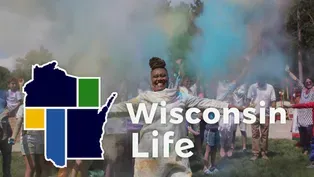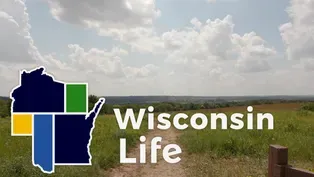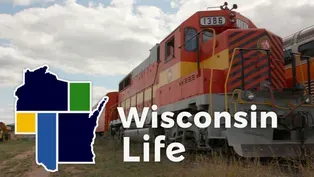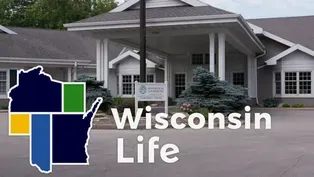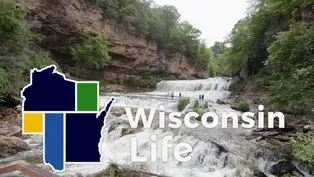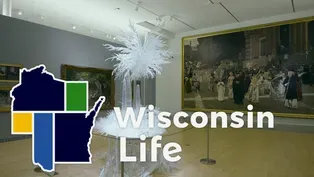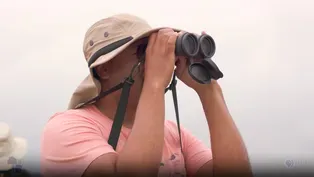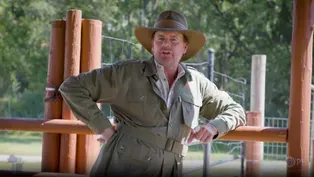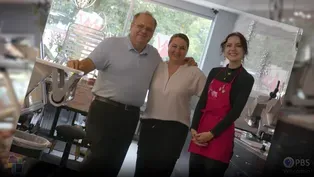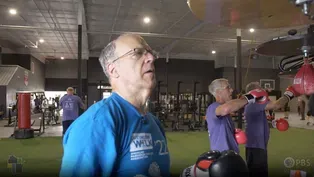
Sailing Education Association of Sheboygan
Season 10 Episode 3 | 26m 48sVideo has Closed Captions
We learn about adaptive sailing with SEAS, the Sailing Education Association of Sheboygan.
Angela Fitzgerald joins an adaptive sailing adventure with the Sailing Education Association of Sheboygan, or SEAS. We also meet a bird watcher and his BIPOC Birding Club of Wisconsin, a Madison doctor battling Parkinson’s disease through boxing, the owners of Milwaukee’s Wioletta’s Polish Market, and we tour a safari park near Lake Geneva.
Problems with Closed Captions? Closed Captioning Feedback
Problems with Closed Captions? Closed Captioning Feedback
Wisconsin Life is a local public television program presented by PBS Wisconsin
Funding for Wisconsin Life is provided by the Wooden Nickel Fund, Mary and Lowell Peterson, A.C.V. and Mary Elston Family, Obrodovich Family Foundation, Stanley J. Cottrill Fund, Alliant Energy, UW...

Sailing Education Association of Sheboygan
Season 10 Episode 3 | 26m 48sVideo has Closed Captions
Angela Fitzgerald joins an adaptive sailing adventure with the Sailing Education Association of Sheboygan, or SEAS. We also meet a bird watcher and his BIPOC Birding Club of Wisconsin, a Madison doctor battling Parkinson’s disease through boxing, the owners of Milwaukee’s Wioletta’s Polish Market, and we tour a safari park near Lake Geneva.
Problems with Closed Captions? Closed Captioning Feedback
How to Watch Wisconsin Life
Wisconsin Life is available to stream on pbs.org and the free PBS App, available on iPhone, Apple TV, Android TV, Android smartphones, Amazon Fire TV, Amazon Fire Tablet, Roku, Samsung Smart TV, and Vizio.
Providing Support for PBS.org
Learn Moreabout PBS online sponsorshipMore from This Collection
Blackhawk Ski Club in Middleton
Video has Closed Captions
We explore the competitive side of winter sports with the Blackhawk Ski Club in Middleton. (26m 48s)
Holi Festival of Colors in Wausau
Video has Closed Captions
We celebrate the Holi Festival of Colors at the Monk Botanical Gardens in Wausau. (26m 49s)
Retzer Nature Center in Waukesha
Video has Closed Captions
Angela visits the wild side of Waukesha at the Retzer Nature Center and planetarium. (26m 48s)
Wisconsin Great Northern Railroad in Trego
Video has Closed Captions
All aboard the Wisconsin Great Northern Railroad for a historic ride in the Northwoods. (26m 48s)
Video has Closed Captions
We tour Riverview Gardens in Appleton, a non-profit offering job training and employment. (26m 48s)
Willow River State Park in Hudson
Video has Closed Captions
Explore Willow River State Park’s stunning waterfall, serene lake and endless trails. (26m 48s)
Museum of Wisconsin Art in West Bend
Video has Closed Captions
Celebrate artists in our state at MOWA, Museum of Wisconsin Art in West Bend. (26m 49s)
Providing Support for PBS.org
Learn Moreabout PBS online sponsorship- The following program is a PBS Wisconsin original production.
- Angela Fitzgerald: Coming up on "Wisconsin Life"... meet a self-proclaimed 'bird nerd,' a boxing class pushing Parkinson's disease up against the ropes, a couple bringing a piece of Poland to a Milwaukee neighborhood, and the owner of a safari park near Lake Geneva.
It's all ahead on "Wisconsin Life."
[upbeat music] ♪ ♪ - Funding for "Wisconsin Life" is provided by Lowell and Mary Peterson, Alliant Energy, donors to the Focus Fund for Wisconsin programs, and Friends of PBS Wisconsin.
- Ahoy, there.
I'm Angela Fitzgerald, and this is "Wisconsin Life."
It's all hands on deck as we join the Sailing Education Association of Sheboygan, or SEAS, a nonprofit on a mission to make boating more accessible.
These docks are located on the shores here in Sheboygan, a perfect spot to set sail.
The Sailing Education Association of Sheboygan offers a variety of boating opportunities, helping everyone to take part to find their inner sailor.
[upbeat music] ♪ ♪ Their community boating program offers an affordable way to rent equipment... ♪ ♪ While adaptive sailing gives people of all abilities the opportunity to take command of a boat.
♪ ♪ Experienced instructors help sailors of all levels become more confident charting their course out on the water.
♪ ♪ We're preparing for our own journey out on the lake.
But first, let's meet someone else making waves in our state.
[shimmery music] We fly to the Patrick Marsh Wildlife Area in Sun Prairie to meet a bird enthusiast encouraging others to join his flock.
♪ ♪ - Dexter Patterson: Red-winged blackbird there.
That's a male.
I always tell people birding is not about the birds.
♪ ♪ - Dexter Patterson is a self-described 'bird nerd.'
- I just love it.
It's changed my life.
I've seen how it's changing other people's lives.
- For Dexter, birding opened a new window on life.
He discovered nature can be healing.
- There's a great blue heron in a tree.
Before I found birding, I actually was struggling with mental health issues, depression, anxiety.
I was, like, 45 pounds heavier than I am now.
You know, they say, the early bird gets the worm.
I'm getting up early, and I'm out, and I'm exploring all these places.
And I just started feeling good.
So I was like, this is awesome.
If it could do this for me, maybe it can help somebody else.
- Dexter and his former college advisor, Jeff Galligan, are the co-founders of the BIPOC Birding Club of Wisconsin.
- I think it's important because representation matters.
- BIPOC stands for Black, Indigenous, and People of Color.
- I'm like, "Jeff, just look around, man.
"Like, there's nobody like us leading any of the stuff that we love."
So that's what our group is about, is really just trying to bring people together, especially get more people of color outside to show them that these natural spaces are for you.
Yeah!
[laughter] - The Patrick Marsh Wildlife Area is the gathering spot for this new birder meetup.
- In my backyard, there's all kinds of birds back there.
- Whenever we get together, we get in a circle.
We do intros, and we try to figure out, have you done this before?
Y'all right on time.
We can do your intro now.
Sometimes you don't know what you don't know, and they get outside, and they're like, wow, I didn't know I was going to have that much fun.
Let's get started on this beginner birder walk.
Y'all ready?
We are a community of color, but we also invite everyone that supports our mission of creating a more inclusive outdoor experience in Wisconsin.
And to me, that's what it's about.
We all have more in common than we have different.
- On the birding club's one-year anniversary, membership is soaring.
- It's been mind-blowing in a sense of it's only been a year.
Say bird nerd!
- All: Bird nerd!
- Awesome.
We try to tell them you don't need to be a pro.
Just look for the movement.
You could just sit here for a minute, and you'll hear multiple bird songs and calls.
You see the song sparrow perched there?
There he is.
- Green heron flying over-- - Green heron!
I get a little excited sometimes.
Look at those little baby wood ducks!
- The enthusiasm is real as Dexter helps others become bird nerds.
[imitating Oprah Winfrey] - Yeah, you get a bird, you get a bird, you get a bird!
I spend a lot of time with the new birders.
eastern kingbird.
It's a good size.
It's about this size.
Talk about bird joy.
It's one of my absolute favorite birds.
It's such a badass bird, and it has a badass name too.
Tyrannus tyrannus.
- Besides getting the chance to spot an eastern kingbird, there's another reason why Dexter takes new birders under his wing.
- Feeling safe outside is important.
We hear that from our members a lot.
They're like, I've always wanted to go out and explore the woods, but I'm afraid.
- Hey, thank you.
- A lot of times, these natural areas, you're in rural areas.
They might not be used to seeing people like you in their neighborhoods, let alone with binoculars or a big camera and things.
We provide that safety.
We provide that space.
When you're out with 30, sometimes 40 people, that experience allows you to actually take in the beauty that you're seeing.
Oh, man, look at the swans out there in all their glory.
Fun fact about the trumpeter swan-- it is actually the heaviest bird native to North America.
So you're seeing something pretty remarkable right now.
It's trying to break down these barriers of what a birder looks like.
As a human being, that really touches my heart because I know we're touching people, and we're moving the needle in our state, and we're making our community better.
My children mean the world to me.
I want to make the world a better place for them.
It's just, these last few years have been rough.
Look, there's that thing.
Yes.
That was so cool.
I talked about those mental health benefits.
I'm exploring, and I'm feeling good about myself.
So that's why I'm excited.
The great blue is like-- I feel like birds saved me.
- How does it go again, Dexter?
[laughter] - I'm happy about life again.
[soft music, laughter] [shimmery music] - Now we catch up with a doctor and his boxing class in Fitchburg, finding power in their punches.
♪ ♪ Stan Livingston likes to stay in motion.
- I like getting up in the morning and figuring out what exercise I'm going to do that day.
It makes me feel better.
♪ ♪ - A retired physician, he knows the importance of physical activity.
♪ ♪ He spent years trying his hand at triathlons... - Stan Livingston: Over a 20-year period, I did a lot of triathlons, mostly short ones.
You know, what's called sprint triathlons that last anywhere from an hour, an hour and a half.
- Eventually, working up to a tougher test, Madison's annual Ironman competition.
- It's a 2.4-mile swim, it's a 112-mile bike ride, and it's a marathon.
So it took me about 13 1/2 hours.
It was a goal that I set out to accomplish, and I was able to do it, so it was gratifying.
[upbeat music] - Today, Stan doesn't run triathlons, but still stays fit using his fists.
- One, two, three, four, five, six, seven, eight, nine, ten.
- This is Rock Steady Boxing in Fitchburg.
It's a non-contact boxing fitness class.
- Seven, eight, nine, ten.
- Patti Batt: You have to have balance.
There's a lot of balance with boxing.
You have to have coordination.
You have to have strength.
Over here!
One, two, switch stance, one, two.
- One, two.
- Strength, coordination, balance.
- One, two.
- These things are important because Stan and everyone else in this class has been diagnosed with Parkinson's disease.
- So I was diagnosed, I believe, around 2014.
I noticed that I had a tremor in my hand.
I was-- went to see the physicians, and they confirmed that it was Parkinson's.
Yeah.
- Parkinson's is a neurological disease with no cure.
It deteriorates motor skills, memory, and much more.
Stan says some days, he still doesn't believe it.
- There's a lot of adjustment to realizing that you have a degenerative disease that just by its nature is gonna get gradually worse over time.
- And they're told, you have this degenerative neurological disease, and there's no cure.
And it's kind of like, well, what the heck do I do with that?
- One, two, three, four, five, six.
- Stan is fighting back.
He attends Rock Steady Boxing almost every chance he gets.
- And let's go!
Let's get at it!
- Instructor Patti Batt does not pull punches with this workout.
- They are fighting for their lives.
They're fighting really hard against a disease that really pushes them and challenges them every day.
So, to come in here, they need to really go at it full force.
Punch it out, and let me hear it!
- The class combines cardio and boxing to slow the progression of Parkinson's symptoms.
- Come on, you guys, let's get it, go!
They're doing things that they didn't realize they could do, and I think it gives them hope.
And I feel like that's a lot about what this is about, giving people hope.
Whoo!
You're almost there.
- And for Stan, a fun, social way to keep exercising.
- Sometimes, if I wake up and I feel sort of grumpy or tired, and I know that if I get to class, my mood will improve, and I'll feel good afterwards.
- Patti sees Stan setting the pace for his peers, even when Parkinson's pu shes him up against the ropes.
- He's a quiet leader.
I'm loud and out there and craziness.
And switch!
Whoo!
But Stan leads a little differently, but he's definitely a leader with this group, and people really look up to him.
- A lot of times, we don't have a choice of what problems we face, but we do have a choice in how we address them or how we cope with them.
♪ ♪ - Switch!
- Facing the fight of a lifetime, Stan plans to go the distance.
- Now, deep breath, tuck that chin in.
- You can still live well with Parkinson's.
You know, that's basically what we're all trying to do, you know, to understand the challenges, but still have a full and meaningful life.
- All: One, two, three!
Family!
[applause] - Whoo!
- Let's hear it for our volunteers!
- Yeah!
- Whoo!
- We're with the Sailing Education Association of Sheboygan, learning the ropes here on the coast of Lake Michigan.
SEAS provides a variety of ways for everyone to set sail with a community sailing program, youth or adult classes, and adaptable sailing.
I chatted with sailing coach Juju about what to expect before we go on an adaptable sailing trip with Sophie and her family.
- Juju Senfft: So, I'm the adaptive sailing coach here at SEAS.
And, like, our mission at SEAS is boating for everyone.
S,o we just want to make sure that everyone gets a chance to enjoy this awesome asset that we have here: Lake Michigan.
So, we don't want a disability to be a barrier.
We don't want financial to be a barrier.
So we're trying to make sailing as accessible as we can for everyone.
- I love that.
And can you break down more what an accessible sailing coach is, or, like, the work that you do?
- Juju Senfft: Yeah, so I work with people with all kinds of different disabilities.
Today, we'll take someone that uses a wheelchair out sailing.
We have everything set up that a person could need.
So we have a special lift to lift them.
We have a special chair built on the boat that is secured to the boat, so that person is totally safe.
And they can fully control the whole boat using four buttons or bite switches, whatever.
We can make it work for them.
Perfect.
There you go.
Already looks like a sailor.
Stepped on the boat just like a sailor.
Today, we're going to go out sailing.
This is a sonar, and Sophie is going to be in charge of helping us trim the sail, so control how far the sails are in and out.
And also, once we're out there, Angela, you have the chance to drive the boat as well.
- OK. - And Sophie will be in control of our sails.
- It was time to head out of the marina.
- If you sail enough, you're going to have spent a lot of time on the high side and a lot of time on the low side.
And I just got pooped on by a bird.
- That's what that was?
- Yeah.
Sailboats cannot go on a straight-- like, straight into the wind.
So a lot of the times, we have to do this big zigzag in order to get to where we want to go.
- And that's called tacking?
- Mm-hmm.
All right, Sophie, can you trim the sails in a little bit more for me, please?
- I think that should be good - Yeah.
That's good.
- OK. - Awesome.
Perfect.
♪ ♪ All right, so yeah, with your backhand, you're going to hold on to the tiller.
So this is the tiller.
This is what we're using to steer the boat, Angela.
So pull it towards you and see what happens to the boat.
♪ ♪ - It goes that way.
- Yep.
- To the right.
- See how our sails are flapping?
Right now, we're pointing straight into the wind.
- OK. - All right, now we're gonna point right at the lighthouse.
- Oh, OK. - Do you see the lighthouse?
It should be popping right on the right side.
- Yes.
- There we go.
Perfect.
So now, we're going to go and sail straight into the-- not straight into the lighthouse, [laughter] towards the lighthouse.
♪ ♪ - Margaret Brandau (mom): She's done some things in the past that she's like, yeah, I'm not doing that again because she wasn't comfortable.
And this, right away, I mean, even these yoga blocks that-- you know, her skin's real sensitive, so any of these edges, they just took care of it immediately.
Like, OK, we can pad this, we can do this, position her head in such a way that she can really function at her best.
So it's been just an awesome experience.
♪ ♪ - Every trip like this fulfills the mission of the Sailing Education Association of Sheboygan.
♪ ♪ [shimmery music] We're off to Milwaukee, where a husband-and-wife team run an authentic Polish market.
♪ ♪ [bell tolling] [soft music] For 150 years, Milwaukee's been a beacon of hope for Polish immigrants.
- Polish immigration isn't as great as it used to be.
So it's our way of kind of keeping it going.
- Go, go.
- Adam and Wioletta Bartoszek work hard to preserve their Polish traditions.
- This is the actually stuff you can see on the shelf in the Poland.
- The Bartoszeks opened Wioletta's Polish Market in 2022.
- I always just want to have something that it's mine.
- My wife's name is unique.
You know, it's pronounced, "Violetta."
Most people pronounce it incorrectly, but that's what makes it memorable, right?
[laughs] - Having run a grocery store in Poland, Wioletta had confidence she could do it again in Wisconsin.
- My mom, she was panic.
[laughs] She said, "I don't know, it's a lot of work."
And I said, yeah, if you want to have something, then you have to work.
Life is not that easy.
I'm proud I'm Polish.
And, you know, I think we are hardworking people.
- The market is located near the same neighborhoods hardworking Polish immigrants first settled.
- We wanted kind of that authentic storefront feel in a neighborhood.
I grew up on the South Side of Milwaukee.
And this is about as South Side as it gets, in essence.
- To make the store authentic, Adam tackled the restoration of an old hardware store.
- I'd come in after work.
It took me about three months to get all the renovations.
It has more of a home feel than a store.
Poland has a lot of history.
Buildings have a lot of character.
But I think it's about as close as we can get.
- Another key ingredient, Wioletta had culinary experience in her native Poland.
- Yes, I am a chef.
I want to do something from my country that just represent me just, like, a person.
- On this day, she is mixing a traditional Polish salad.
- Salatka jarzynowa, it's just like a vegetable salad.
When I was kid, I remember when my mom and my grandma, they just make every Christmas and Easter.
It was a lot of work because we just chop everything with the knife by hand.
That's why we don't make this salad very often.
I got some muscles.
It's a lot of vegetable, that's for sure.
And that mustard-- it's not Polish, but tastes good.
[laughs] Everybody just love it.
We just waiting for Christmas and Easter.
[laughs] - People like authentic good food.
- The store also boasts an authentic old-fashioned meat counter.
- Like Polska kielbasa.
Oh, first the smell of the kielbasa.
Yeah, that's what a lot of people just say.
They just enjoy the smell.
- There's a wide variation of sausages.
So everyone really wants to know, what's the difference?
- Anything else?
- From fresh Polish to paczkis and pierogies, the market attracts both young and old.
- A large majority of our customers are second, third, fourth generation Polish.
So they look back at their memories with their grandparents and parents and, like, relive that when they stop here.
- They just make me happy.
Make me happy.
[speaking Polish] That's my daughter, Samantha.
[speaking Polish] We are a Polish family who speaks Polish.
We keep the tradition.
- At the end of the day, for the Bartoszeks, it's about family, traditions, and hanging on to that Polish pride.
- I think that that's a good amount, right?
- It's your heritage.
It's something you try to keep because otherwise, eventually, there's no one to pass it on to.
- I feel just like I have a Poland here, just a little bit of Poland.
And success, yep.
That's for sure.
Yeah, we're just dancing.
[laughter] [shimmery music] - For our last story, we get wild in Walworth County with the founder of a safari park who's known as Jungle Jay.
♪ ♪ - Jay Christie: We 're situated on 75 acres here.
And it's got some interesting rolling topography to it.
- Jay Christie's lifelong dream is nestled amongst farm pastures in Southern Wisconsin.
- It was so evocative of the savanna areas of East Africa.
And, of course, this originally was a savanna.
- Good morning.
- This is Safari Lake Geneva.
- It's an institution that was founded in the interest of helping save wildlife around the world.
Folks, if you didn't hear, I'm Jungle Jay.
I'm one of your co-hosts today.
I also founded this place.
Does anyone have any questions?
- Jungle Jay, as he likes to be called, founded this drive-through wildlife park in 2016.
- Look at that big animal.
- Well, it's a dream come true for me.
I've been really quite obsessive about animals since I was very young.
In fact, "zoo" was the first word I learned how to read.
Safari is the opposite of a zoo in that the animals roam at liberty, much as they would in the wild, and people are in the cages, of course, their own cars.
- Feeding zone starts here.
- Unlike a real safari, our guests are allowed to actually feed the animals, which makes it very interactive.
- I'm doing it.
I'm doing it!
[gasps] Come on, buddy.
You want some?
You want some, big boy?
- You're being surrounded on all sides by these animals.
- Look at those antlers.
- Whoa.
- Wow.
- It might just be that this is every bit as exciting as an actual African safari because it's a photographer's paradise.
- I'm holding on for dear life.
- OK. - Oh.
[laughter] That was a good one.
- The animals represent every continent except Antarctica.
- There's an ostrich.
- I never seen an ostrich before.
I only seen turkeys.
- We do have animals from Africa, like these ostriches, zebras, giraffes.
She might be showing me that she's bigger than she actually is.
And therefore, she doesn't want to get pushed around too much.
We also have animals from Asia, like the nilgai antelope, the largest of the Asian antelope.
- They don't-- - Hi, Layla.
Hi, Layla, right there.
Good girl.
- We got some big, big animals coming up, including our bison.
That is right, they are bison, not buffalo.
- Whoa, look at that one!
- We have the largest mammal native to the Americas, and that's the Plains bison, the same type that used to roam these very hills just a few hundred years ago.
The worst bucket bandits are here.
We're allowing people to do things that would be maybe ill-advised in the wild.
And the bison, of course, are a premium example of that.
- None of the animals on this game reserve were actually born in foreign lands.
- Every single one of them you see here was born right here in good old North America.
My point is we don't have animals here that were captured from the wild.
- In the wild, some of these same animals are under the threat of extinction.
- Addax are actually the most endangered antelope in the world right now.
We do have three right there.
- The world's wildlife is under tremendous pressures.
This is really an excellent opportunity for people to develop an empathy for animals and wildlife conservation, in particular.
- For Jungle Jay, an Af rican-style conservation park on a 20th-century dairy farm didn't seem that far-fetched.
- At one point, quite clearly, it was a working dairy farm.
We think that this is a great repurposing because that same barn that a hundred years ago held hay for dairy cattle now holds hay for some of the most imperiled species from around the world.
All right, so you just kind of hold it out like a wand.
They'll just grab it with their tongue.
- Yeah.
- That tongue is actually 18 inches long.
♪ ♪ Safari Lake Geneva is a conservation park.
- She's happy.
- A portion of our proceeds every year goes to help support wild animals and wildlife conservation here in the Americas, as well as in Africa and Asia.
Sure.
Certainly, a tremendous sense of satisfaction being able to make a living from what otherwise would probably be a maybe expensive hobby.
- From a little boy with a wish to a reality that turned out better than his wildest dreams.
- Jungle Jay is definitely in his element out here on the burr oak savanna.
I feel so fortunate that we did land on this property.
It's really fulfilling, almost beyond words.
♪ ♪ [shimmery music] - It's been smooth sailing with the Sailing Ed7ucation Association of Sheboygan, all while sharing stories from across our state.
Discover our entire collection of radio and TV stories by visiting WisconsinLife.org or connect with us on our social media channels.
Until our next outing, I'm Angela Fitzgerald, and this is our "Wisconsin Life."
Anchors away!
♪ ♪ - I'm telling you, this is the "Sher-ribbean."
[laughter] - Funding for "Wisconsin Life" is provided by Lowell and Mary Peterson, Alliant Energy, donors to the Focus Fund for Wisconsin Programs, and Friends of PBS Wisconsin.
Video has Closed Captions
Clip: S10 Ep3 | 4m 56s | “Bird Nerd,” Dexter Patterson, brings birding to communities of color. (4m 56s)
Video has Closed Captions
Clip: S10 Ep3 | 4m 54s | As a boy Jungle Jay Christie always dreamed of owning his own wildlife conservation park. (4m 54s)
Video has Closed Captions
Clip: S10 Ep3 | 4m 24s | Milwaukee is home to a Polish market where language, traditions and authentic food reside. (4m 24s)
Video has Closed Captions
Clip: S10 Ep3 | 4m 55s | A non-contact boxing exercise class for people diagnosed with Parkinson’s. (4m 55s)
Providing Support for PBS.org
Learn Moreabout PBS online sponsorshipSupport for PBS provided by:
Wisconsin Life is a local public television program presented by PBS Wisconsin
Funding for Wisconsin Life is provided by the Wooden Nickel Fund, Mary and Lowell Peterson, A.C.V. and Mary Elston Family, Obrodovich Family Foundation, Stanley J. Cottrill Fund, Alliant Energy, UW...

